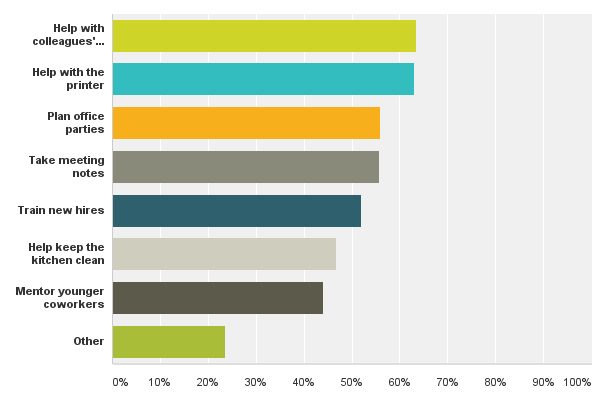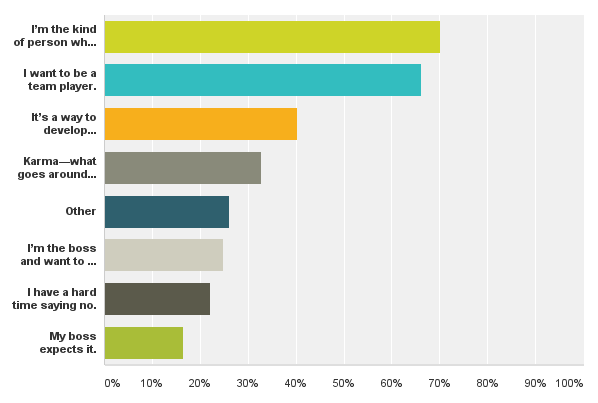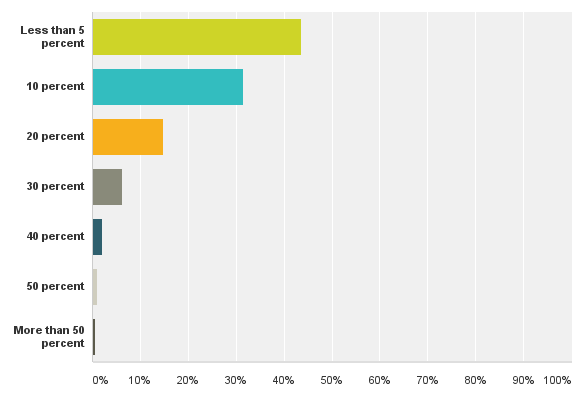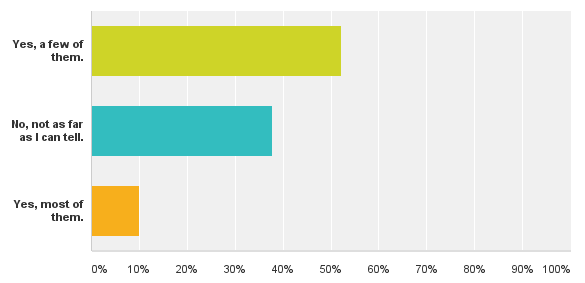CFW SURVEY: ‘I Care’ and the Other Reasons You Do ‘Office Housework’
 Editing a colleague’s report, taking meeting notes, refilling the printer paper tray—the non-job-description stuff you do at work to help someone, your team or the company at large has a name. “Office housework”—and as at home, the bulk of it falls to women, who mostly do it to little acknowledgment, let alone acclaim, reported Sheryl Sandberg and Adam Grant in a recent New York Times article. What’s more, they say, it’s another example of gender bias: Men are praised and rewarded if they pitch in, while women are penalized for not helping.
Editing a colleague’s report, taking meeting notes, refilling the printer paper tray—the non-job-description stuff you do at work to help someone, your team or the company at large has a name. “Office housework”—and as at home, the bulk of it falls to women, who mostly do it to little acknowledgment, let alone acclaim, reported Sheryl Sandberg and Adam Grant in a recent New York Times article. What’s more, they say, it’s another example of gender bias: Men are praised and rewarded if they pitch in, while women are penalized for not helping.
But is office housework that widespread a burden and do women do it because we have to? We asked our readers and a whopping 2,218 of you responded. You have strong feelings about the topic, ranging from resentment to bemusement. Here’s what you said:
YES, YOU REGULARLY DO OFFICE HOUSEWORK.

63% Help colleagues with their work (e.g., edit their report, babysit a project while they’re out sick, answer their phone for them, handle the technology during their Powerpoint presentation)
63% Help with the printer (e.g., fix printer paper jams, replace printer cartridges, refill printer paper)
56% Plan office parties (e.g., buy the birthday/goodbye/new baby card and pass it around, bring the cake and knife, etc.)
56% Take meeting notes
52% Train new hires
47% Help keep the kitchen clean (e.g., wipe down the office kitchen counter and tables, throw out food in the office fridge that’s gone bad, wash dishes left in the office sink)
44% Mentor younger coworkers who are not on your team
Additionally, 501 people wrote in tasks that we didn’t list, most notably: helping with everything meeting-related (including scheduling, reserving the room, setting the agenda, ordering any food, noting who is absent so you can give them your notes, cleaning afterward and flipping the lights off), serving on committees (such as “the Fun Committee, the Cultural Committee, the Connecting Women Committee and the Company Blood Drive Committee,” as one respondent wrote) and basically acting as a hotel concierge/help desk fielding requests for restaurant recommendations, office equipment and building repairs and technology problem-solving.
Also, a surprising number of women reported doing more actual housework than we specified, including sweeping, vacuuming, dusting, defrosting the freezer, descaling the coffeepot, running the dishwasher, throwing out trash—and even cleaning toilets.
WHY DO YOU DO IT?
70% I’m the kind of person who helps when she can.
66% I want to be a team player.
40% It’s a way to develop friendships and good relationships.
33% Karma—what goes around comes around.
25% I’m the boss and want to set a good example.
22% I have a hard time saying no.
16% My boss expects it.
In other words, most women do not do office housework because they feel obligated to. In addition to the reasons above, they wrote in such explanations as, “It’s just easier to do it myself,” “I can’t stand the mess,” “It’s the right thing to do,” “I care,” “I hate mice” and “It gives me a mental break from what I’m doing.” That’s not to say that some people didn’t feel mild resentment (“There is no system!”)—and some felt a lot (“The majority of my coworkers are uncaring and lazy and constantly pass the buck. Unfortunately, I don’t have the power to fire them, so a minority of us do the bulk of the work.”) But overall, the most recurring written-in reason was along the lines of, “Someone has to do.”
BUT FOR MOST, IT’S NOT THAT BIG A DEAL.
More than 75% said that these tasks take up less than 10% of their day, with almost 44% saying they take up less than 5% of their day.
As a result, 72% say they don’t regularly have to stay late or work on weekends because of the extra work.
That said, for the 28% who do put in longer hours, office housework can be an issue.
AND NOT ALL MEN ARE SLACKERS.
While 38% say that no men in their office pitch in, 52% say a few men do—and 10% say most men do.
IN THE END, WOMEN DO THINK THAT THE GENDER BIAS EXISTS.
More than three-quarters of respondents agreed that any expectations around office housework are in men’s favor. Some have seen this firsthand:
“I did all the work researching, ordering and picking up the food for a large conference being held in my office, and it was the guy who helped carry the food from my car who got the praise for ‘helping out.’”
“Just the other day, the copier ran out of paper when a man was using it. He put in one ream of paper to finish his job, and the people standing there waiting to use the copier thanked him. The copier actually holds three reams and when female employees including myself fill it completely (the supply is right there), no one says a word.”
Some think it’s probably true:
“I haven’t seen this personally since I work mostly with women, but it wouldn’t shock me.”
“I’ve never seen a man help around the office, but if one did, he would be treated like a hero.”
“It is like the way mothers praise their sons for doing laundry while daughters are expected to do it.”
And several people questioned the praising:
“In my office, the praise would be sarcastic.”
“Are you sure it’s not the men praising themselves?”
YET THERE IS A BRIGHT SIDE.
Ultimately, it’s not about the praise or recognition for most (52% said management does not give them credit for being helpful). It’s about working in a clean, collegial environment that’s conducive to getting your job-description stuff done. If that means throwing away an empty donut box here, filing a repair ticket there—well, you’re hardly alone. And with more women in the workforce and more of them the boss, attitudes can only change. Indeed they’re already improving, since almost a quarter of respondents did not think office housework is a gender issue.
And for those stuck in gender stereotypes? What worked to lighten the office housework load for one respondent may work for you: she simply hung a sign that says, “I am not your mother.”


